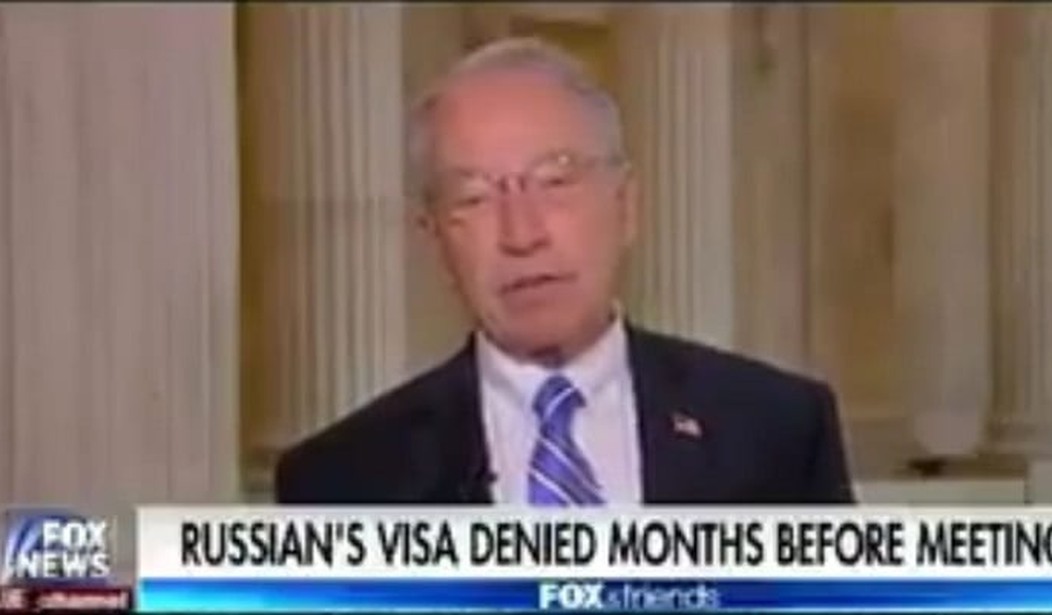The meeting of Donald Trump, Jr. and Russian lawyer Natalia Veselnitskaya has drawn the attention of Senate Judiciary Committee Chairman Charles Grassley. But it isn’t the attention that the people howling “treason” and “collusion” want to hear.
Grassley is asking how in the name of hell that Veselnitskaya was able to meet with Trump, Jr. as she was barred from entering the United States.
.@ChuckGrassley: Russian lawyer’s visa was denied, so what was she doing in the U.S. at the time of the meeting with Donald Trump Jr.? pic.twitter.com/Qy62ml32ff
— FOX & friends (@foxandfriends) July 12, 2017
Natalia Veselnitskaya, the Russian lawyer who met Donald Trump Jr. in New York last summer, said she was denied a U.S. visa in 2015.
She then asked federal prosecutors for permission to enter the U.S. to work on behalf of a client in a Manhattan. Prosecutors granted Veselnitskaya temporary “immigration parole” in late 2015 but it expired in early 2016, the U.S. Attorney’s Office of the Southern District of New York told The Daily Beast.
Veselnitskaya’s parole was not renewed, the U.S. Attorney’s Office added.
That raises the question of how Veselnitskaya was able to enter the U.S. in June 2016 when she visited Trump Tower.
Ordinarily once a visa is denied it isn’t going to be approved in the future as the reason for the denial can’t really change. Grassley adds more detail in his letter:
In the declaration, Veselnitskaya testified that she was denied a U.S. visa when she sought to travel to the United States from Russia to participate in the litigation, but was issued a “parole letter” by the U.S. government that permitted her to enter for that purpose. Although the timeline of events is not perfectly clear, it appears that she was eventually granted this parole in 2015. According to her testimony she was also detained for two hours at London’s Heathrow airport when she was travelling back to the United States from a trip to London in November, 2015.
Notably, Veselnitskaya’s declaration stated that her parole was set to expire on January 7, 2016, and that she had requested an extension but was denied on January 4, 2016. 10 Indeed, she noted: “Prior to [January 7, 2016], I will have to leave the United States.”
However, according to news reports, many months later Ms. Veselnitskaya allegedly met with Donald Trump Jr., Jared Kushner, and Paul Manafort at Trump Tower in New York City on June 9, 2016. It is unclear how she was still in the country for that meeting despite being denied a visa beforehand and her parole purportedly expiring on January 7, 2016. This raises serious questions about whether the Obama administration authorized her to remain in the country, and if so, why?
Interesting.
This is a story that has a lot more moving parts than shouting “Russia is not our friend” and crawling under the bed. Veselnitskaya had a relationship with Fusion GPS, the Democrat opposition research firm that produced the fraudulent Trump dossier. The Russians were up to their eyebrows in the production of the Trump dossier–check the identified sources if you doubt me–and the author and apparent FBI contractor, Christopher Steele, had professional ties to Russian intelligence. If one goes back to the FBI/CIA assessment released shortly after the DNC “hacking,” you find the reading of Russian intentions was to cause confusion and discredit the winner of the election. The whole “Russia wanted Trump to win because they were afraid of Miss Reset Button” didn’t appear until after Trump won.
How did someone who couldn’t get a visa to the US manage to travel to attend a meeting with Trump, Jr.? I’m sure there is a very reasonable explanation for this but, like Grassley, I’m coming up short right now.
The Russian lawyer who penetrated Donald Trump’s inner circle was initially cleared into the United States by the Justice Department under “extraordinary circumstances” before she embarked on a lobbying campaign last year that ensnared the president’s eldest son, members of Congress, journalists and State Department officials, according to court and Justice Department documents and interviews.
This revelation means it was the Obama Justice Department that enabled the newest and most intriguing figure in the Russia-Trump investigation to enter the country without a visa. Later, a series of events between an intermediary for the attorney and the Trump campaign ultimately led to the controversy surrounding the president’s eldest son.
…
The Moscow lawyer had been turned down for a visa to enter the U.S. lawfully but then was granted special immigration parole by then-Attorney General Loretta Lynch for the limited purpose of helping a company owned by Russian businessman Denis Katsyv, her client, defend itself against a Justice Department asset forfeiture case in federal court in New York City.
During a court hearing in early January 2016 as Veselnitskaya’s permission to stay in the country was about to expire, federal prosecutors described how rare the grant of parole immigration was as Veselnitskaya pleaded for more time to remain in the United States.
“In October the government bypassed the normal visa process and gave a type of extraordinary permission to enter the country called immigration parole,” Assistant U.S. Attorney Paul Monteleoni explained to the judge during a hearing Jan. 6, 2016.
“That’s a discretionary act that the statute allows the Attorney General to do in extraordinary circumstances. In this case, we did that so that Mr. Katsyv could testify. And we made the further accommodation of allowing his Russian lawyer into the country to assist,” he added.












Join the conversation as a VIP Member